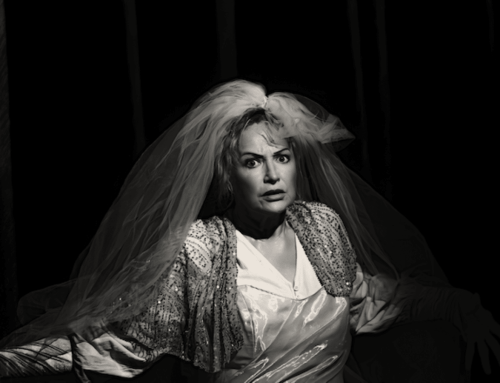Renowned writer-director Mike Leigh, whose works are often rooted in the intricacies of social rank and identity, once proposed that British theatre is preoccupied with class. Arguably, the aphorism is more honoured in the breach than the observance, but former business journalist Judi Bevan seems to have taken it to heart in her thoughtful and provocative debut play, Too Many Books. The piece, an excursion into the Kafkaesque bureaucratic obstacles a middle-class London couple face in adopting a child from China, has bitter class conflict at its heart. Think J.B. Priestley’s An Inspector Calls with a troublesome lefty social worker replacing the mysterious Inspector Goole.
It is the late 1990s. Wholesome fifty-something barrister Daniel (John Sackville channelling The Winslow Boy’s Sir Robert Morton) and his forty-something wife Julia (Lucy Pickles, angsty but oozing inner strength) are desperate for a child. With two failed, spirit-sapping rounds of IVF behind them, they settle on the idea of adopting a baby girl from China. The Chinese authorities are willing. The couple do their research, complete the many forms required, hire a private Mandarin teacher, and attend all the right training courses.
But there is a fly in the ointment. Daniel and Julia, whose hobbies include Wimbledon, theatre, and making their own biscuits (doesn’t everyone?), need approval from a UK adoption panel. Success relies heavily on a favourable home study report from a social worker. Enter working class-ish single-mum Zaydee (Alexandra O’Neill) and her cynical boss at “Forever Families” social work agency Cynthia (Sue Kelvin). Zaydee dislikes prospective parents who think “they’re ordering something from John Lewis”, worries about the couple’s reading choices (“Sex In History isn’t as interesting as it sounds” says Julia), and thinks people with that many erudite books on their shelves will never have time for a needy, abandoned child.
We cannot deny the couple a recommendation “just because they listen to Radio 4 and know what an avocado is”, cautions Cynthia. But Zaydee, who may well resent the couple’s material success and perceived middle-class smugness, has other ideas. Anticipate sparks. The later entry of a different social worker in the form of Chloe (Carol Walton), who herself was adopted by parents of a different race, complicates matters further.
Bevan and her fellow journalist husband John Jay, who produces Too Many Books, successfully adopted a child from China in the late 1990s. Though fictional, the piece, three years in development, draws on their own and other families’ lived experiences. The tsunami of intrusive questions that wash in the couple’s direction – “How many times a week would you say you have sex?” demands Zaydee – have the feel of veracity. Trawling over failed former relationships, a previous abortion, periods of depression and alcohol abuse, and the couple’s attitude to religion, Zaydee’s ‘assessment’ comes closer to hostile interrogation.
While it is clear where the writer’s sympathy lies, some may wonder whether Bevan is provoking us, as a kind of devil’s advocate, to confront our own stereotypes about class. Do white professional characters, with this level of education and economic resource, really deserve the empathy they seem to be asking of us? O’Neill’s skilled, sympathetic, and nuanced turn (the highlight of an evening of universally strong performances) certainly sees Zaydee emerge as fully rounded, more than a mere formulaic judgmental bureaucrat.
Vulnerable and determined to do the right thing, the social worker falls prey to easy class stereotypes rather than seeing the human beings in front of her. That neither Daniel nor Julia are particularly likeable characters makes Zaydee’s behaviour easier to credit. At times it is hard to believe a couple this successful (and who really ought to surface and deal with their own engrained stereotypes about China and social workers) would be quite so irredeemably naïve about the challenges of cross-cultural adoption.
Christopher Hunter’s zippy direction keeps things moving briskly, particularly early on in the tense, acerbic, economically written back-and-forth between an increasingly irate Daniel and the force-of-nature that is Zaydee. Things bog down a little in the wordier and occasionally repetitive second half and, frustratingly, Bevan sidesteps a resolution of the central conflict with a plot twist that feels just a little too pat. A further shocking final act curveball reminds us that adoption can be a brutally transactional business, which one suspects is why people like Zaydee are needed in the process in the first place. Though flawed, Bevan’s debut impresses with its confidence, honesty, and complexity.
Writer: Judi Bevan
Director: Christopher Hunter
More Recent Reviews
Too Many Books. Upstairs At The Gatehouse.
Renowned writer-director Mike Leigh, whose works are often rooted in the intricacies of social rank and identity, once proposed [...]
Remember Me. Ye Old Rose and Crown Theatre.
Most days, 14-year-old Stephy goes from school to visit her much-loved “Nana Penny” at the Sunnyside retirement home. The [...]
TRASH! Peacock Theatre.
Can it really be three decades since global mega hit Stomp, then in a production at Sadler’s Wells, garnered two [...]



